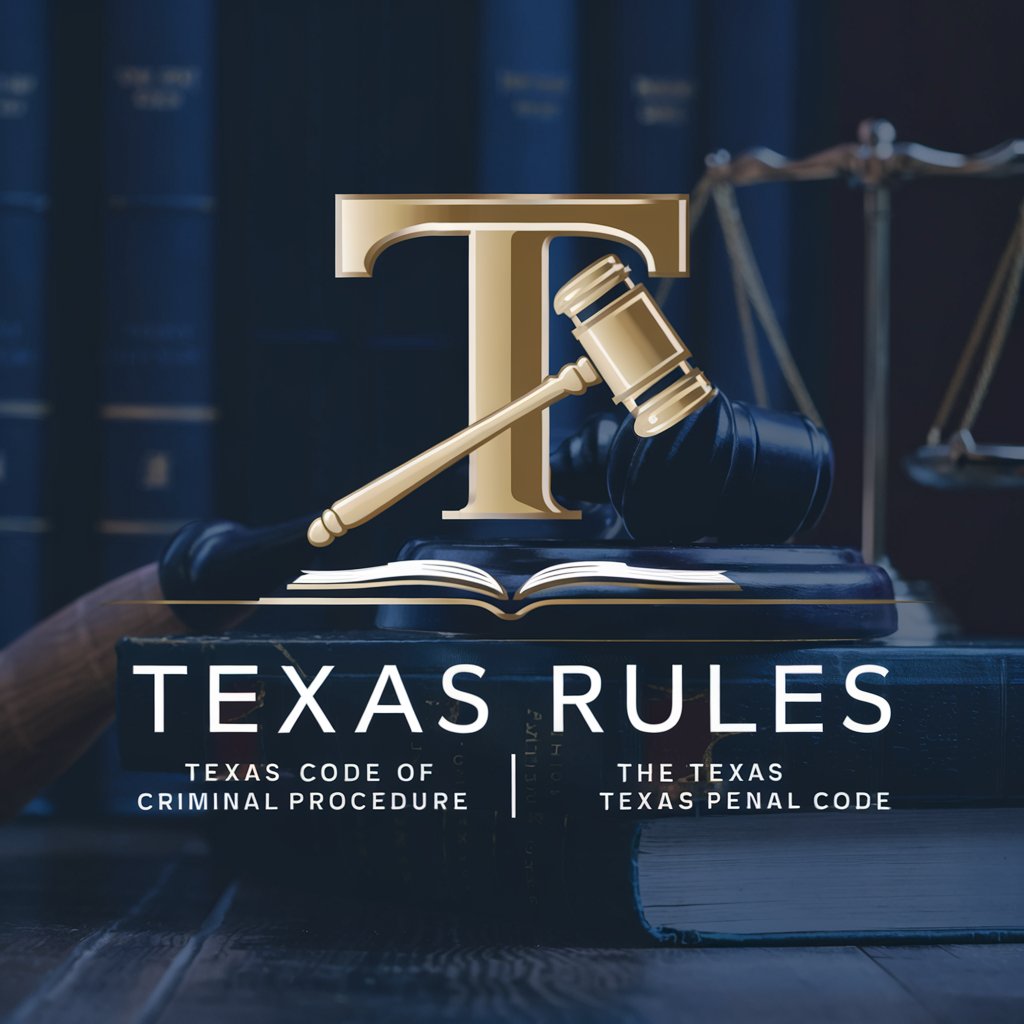Texas Rules - Texas Law Information

Welcome to Texas Rules, your precise legal reference tool.
Empowering Texas Law with AI
Can you provide information on...
What does the Texas Penal Code say about...
Please clarify the section of the Texas Code of Criminal Procedure that...
What is the legal definition of...
Get Embed Code
Introduction to Texas Rules
Texas Rules is a specialized digital assistant designed to provide accurate and detailed information about the Texas Code of Criminal Procedure and the Texas Penal Code. It is programmed to reference specific sections or clauses from these legal texts to ensure precision and reliability in its responses. Texas Rules is tailored to handle queries related to these codes, offering factual information without providing legal advice. For example, if someone inquires about the procedural steps in a criminal case, Texas Rules can detail relevant sections like Article 2.12, which lists who are peace officers in Texas, or Article 15.17, which discusses the duties of arresting officers and magistrates. Powered by ChatGPT-4o。

Main Functions of Texas Rules
Providing Specific Legal References
Example
When asked about the rights of a defendant during a trial, Texas Rules can cite specific rights outlined in Chapter 38 of the Texas Code of Criminal Procedure, such as the right to a public trial without unnecessary delay.
Scenario
A law student preparing for a moot court competition uses Texas Rules to gather exact legal texts and procedural requirements.
Clarifying Legal Terminology
Example
If a user asks for the definition of 'capital felony,' Texas Rules can explain the term with a reference to Section 19.03 of the Texas Penal Code, which defines the crime and its possible punishments.
Scenario
A writer developing a crime novel uses Texas Rules to accurately depict legal scenarios and terminology.
Explaining Judicial Procedures
Example
Texas Rules can outline the process of issuing a search warrant as detailed in Articles 18.01 and 18.02 of the Texas Code of Criminal Procedure, explaining the requirements and limitations involved.
Scenario
A journalist writing about police practices in Texas consults Texas Rules to understand the legal framework governing search operations.
Ideal Users of Texas Rules
Legal Professionals
Lawyers, paralegals, and law enforcement officers who require quick access to specific legal texts and procedural rules for case preparation, training, or during courtroom proceedings.
Academics and Students
Law professors and students engaged in legal studies, research, or coursework that requires detailed understanding and citations from the Texas Code of Criminal Procedure and the Texas Penal Code.
Journalists and Writers
Journalists covering legal stories or writers who need to incorporate accurate legal details and procedures into their work to enhance authenticity and factual correctness.

Guidelines for Using Texas Rules
Start Your Trial
Begin by visiting yeschat.ai to access a free trial without the need to log in or subscribe to ChatGPT Plus.
Explore the Codes
Familiarize yourself with the sections of the Texas Penal Code and Texas Code of Criminal Procedure available within the tool.
Formulate Questions
Draft questions directly related to the codes, ensuring they are clear and specific to get the most accurate responses.
Use Advanced Queries
Utilize advanced queries to explore complex legal scenarios or interpretations that are covered by the codes.
Review and Apply
Review the information provided, cite the specific sections referenced, and apply the insights to your legal research or academic work.
Try other advanced and practical GPTs
Super Robot Gachapon
Unleash creativity with AI-powered robot toy designs.

Warcraft Rumble Assistant
Master Warcraft Rumble with AI-powered Strategy

Classical Maestro
Your AI Conductor to the World of Classical Music

Classical Harmony ♫
Unravel Classical Music with AI

Classical Virtuoso
Explore Classical Music with AI

Classical Composer
Compose classical music with AI

Books Navigator
Uncover Deeper Insights with AI-Powered Summaries

Are You A Narcissist?
Explore Your Personality with AI

Ms. Whiskers
Gossip, reimagined with AI.

How to Live with a Narcissist
Navigating Narcissism with AI Power

Narcissist Insight
Understanding Narcissism with AI

Narcissist Navigator
Navigate Narcissistic Interactions with AI

Frequently Asked Questions about Texas Rules
What sections of the Texas Penal Code can Texas Rules provide information on?
Texas Rules covers the entire range of the Texas Penal Code, offering detailed information and references on various offenses, defenses, and penalties.
How does Texas Rules handle queries about procedural rules in criminal cases?
It provides precise references to the Texas Code of Criminal Procedure, aiding in understanding procedural steps, rights of the accused, and court processes.
Can Texas Rules assist with educational purposes?
Yes, it is an excellent resource for students and educators seeking detailed explanations and legal citations for the Texas criminal justice system.
Is there a way to get examples of legal applications of specific statutes from Texas Rules?
While Texas Rules provides interpretations and information based on the statutes, it doesn't generate hypothetical legal scenarios but can outline the application of laws.
What makes Texas Rules different from other legal information tools?
It specializes in the Texas Penal Code and Texas Code of Criminal Procedure, offering direct citations and detailed legal information specific to Texas law.
